
Best Content Marketing Tools for Enterprise Brands (2022)
Sep 6, 2022|Read time: 20 min.
Key Points
- Content marketing tools help you organize, create, publish, and amplify your content more efficiently.
- Some of the best content marketing tools are completely free.
- Many paid content marketing tools have a free trial period.
Content marketing strategy has changed dramatically over the years, and in 2022 we have dozens, if not hundreds of tools at our disposal. While digital marketing requires human talent and creativity, content marketing tools can make writing, editing, and optimizing a bit more efficient.
Whether you’re building a new campaign, creating a content strategy, doing competitive research, identifying important keywords, distributing your content, building a social strategy, or even designing assets, there’s likely a tool to help. It’s important to understand the full potential of each to make the right investment.
Also, a word of warning. Content tools can help you analyze the SERPs and develop content, but the complexity of a given content space often eclipses the scope of these tools. For enterprise brands looking to break through the competition and noise, a longer term, holistic strategy is the only way to really make an impact.
Once on track, these tools can help. But there is no replacement for a search intent-driven strategy, executed and analyzed by experts, to reach your audiences at all stages of the customer journey.
From production to publishing and everything in between, here are the 25 best marketing tools of 2022 vetted by established content marketing professionals.
Terakeet does not have promotional relationships with any of the brands or tools discussed in this article.
Before you build out your tech stack, make sure you have a content strategy playbook to unify your entire department.
Content Strategy Playbook
The Fortune 500 CMO’s guide to content strategy.
The benefits of content marketing tools
There are huge benefits to building a custom suite of content marketing tools. The right tech stack allows marketing teams to focus on execution, save time on competitive research, draft high-quality content faster, automate tasks, and communicate across disciplines more effectively.
Choosing the best content marketing tools for your business also helps you manage social media accounts more efficiently, measure content marketing ROI, and personalize messaging to valuable audience segments.
Our favorite content marketing tools
Here’s a list of the types of tools I’ll cover in this article, followed by our favorite software in each category:
- Content organization tools
- Content management systems (CMS) tools
- Keyword research tools
- Content marketing tools for ideation
- Content creation tools
- Editing and writing improvement
- Content optimization tools
- Content promotion and distribution platforms
- Email marketing tools
- Content tools for social media
- Content marketing analysis tools
Content tools we discuss in this article:
- Microsoft Office 365
- Google Workspace
- Contently
- WordPress
- Semrush
- Ahrefs
- Keywords Everywhere
- Google Search Console
- Google Analytics
- Exploding Topics
- AlsoAsked
- Adobe Creative Suite
- Canva
- Grammarly
- ProWritingAid
- Hemingway Editor
- Yoast SEO Tools
- Clearscope
- Business Wire
- Mailchimp
- Hootsuite
- Sprout Social
- PR Newswire
- Google Trends
- BuzzSumo
Pricing Key
Pricing is always subject to change, so we’re keeping this general. Most tools have free limited trials, some offer most features for free, and some are totally free. You will see a range for most tools.
Note that “$$$$$” indicates custom or top tier pricing for large enterprises.
| Budget | Price Range |
|---|---|
| $ | Up to $500 annually |
| $$ | $500 – $1,000 annually |
| $$$ | $1,000 – $5,000 annually |
| $$$$ | $5,000 – $10,000+ annually |
| $$$$$ | Enterprise level |
Best content tools for organization
You need exceptional organization to prioritize and execute great content marketing campaigns.
These tools can help you create content, build content calendars, and organize your production teams. You can even use them as project management tools. Here are some of our favorite apps and tools to organize your content marketing efforts:
Google Workspace
What it does well: Formerly known as G Suite, Google Workspace is the business version of Google’s various services. It currently includes Gmail, Google Drive, Meet, Calendar, Jamboard, Docs, Sheets, Slides, Keep, Sites, and Forms. While the personal account versions of these tools are free, the premium Google Workspace offers added features, customization, template options, integration with other apps, and it comes with a low monthly, per-user price so you can get exactly what you need. Google’s suite of services is likely the most important productivity tool out there.
Capabilities:
- Drafting content of any kind
- Creating an editorial calendar
- Editing and quality control (QC) processes
- Strong workflow process
- Collaboration
- Can connect with outside SaS tools
- Large amounts of storage
- Security features
- Simple user interface (UI)
Who needs it: Small agencies up to enterprise-level brands can find a huge degree of versatility, ease of use, and ROI for the affordable cost of Google Workspace. Individual users need not actually get the premium version. Simply creating a Google account gets you access and full functionality across many of these powerful tools.
Pricing: $ – $$
Free trial: No
Microsoft Office 365

What it does well: Microsoft technically invented the original Google Workspace. Its suite of “Office” tools includes Microsoft Word, Excel, PowerPoint, Teams, Outlook, OneDrive, SharePoint, Exchange, and other programs. There isn’t a huge difference between MS Office 365 and Google Workspace. Both offer email, collaboration tools, spreadsheets, presentation software, secure shared drives, and related features. This suite can be tailored to your budget, team size, and security requirements.
Who needs it: Company-wide teams.
Pricing: $ – $$$$
Free trial: Yes
Contently
What it does well: Contently is a platform and a hub that connects freelance content creators with large brands in order to create unique content. Freelancers get listed in the database and can pitch content ideas to brands. Brands can join the service to hire vetted talent on a single engagement basis. While this is awesome for freelancers, content marketers can use the platform to help supplement or scale their content operations. Instead of hiring more content creators on a full-time basis, marketers can pick and choose from a large talent pool as needed. It’s a quick path to high-quality content curation. But, at an enterprise business level, Contently can be expensive.
Who needs it: CMOs, marketers, freelancers.
Pricing: $$$ – $$$$
Free trial: No
Top content management systems (CMS)
Content management systems, or CMS, are the platforms that allow you to create, publish, and host your content. A CMS is also the backbone of many content-heavy websites. Prices vary across platforms, but many content platforms are free or very inexpensive. CMS generally do not include a fully designed site and some require paid templates. Common examples include Drupal, Squarespace, Joomla, Wix, WooCommerce, Shopify, HubSpot, and Blogger. To keep things simple, I’ll just mention the most popular content marketing tool — WordPress.
WordPress

What it does well: WordPress is one of the most installed and versatile CMS options on the market. It can handle sophisticated publishing and blogging, but it’s also a phenomenal platform for building a modern, highly optimized site. WordPress is free and can be accessed in numerous ways. Most web hosting services will automatically install and configure your site in minutes. Then it’s up to the site owner to choose a template, tweak any settings, do custom design work, and install a set of plugins to meet their needs. For creating blog posts and other engaging content, a WordPress site is a must. WordPress is also a solid choice because it integrates with thousands of apps and services, and is easy to optimize for search.
Who needs it: Anyone who needs a website can leverage WordPress to create one. A WordPress blog is a vital marketing tool for freelancers on up to CMOs and large enterprises.
Pricing: FREE (with basic templates, web design not included)
Best content tools for keyword research
In order to publish content that drives organic traffic, you must first understand how your audience thinks. What questions do they ask throughout the customer journey, and how do they phrase their queries? Also, think about how you’ll group keywords into articles, categories, and topic clusters.
Here are some of our favorite keyword research tools to improve your content marketing performance.
Semrush
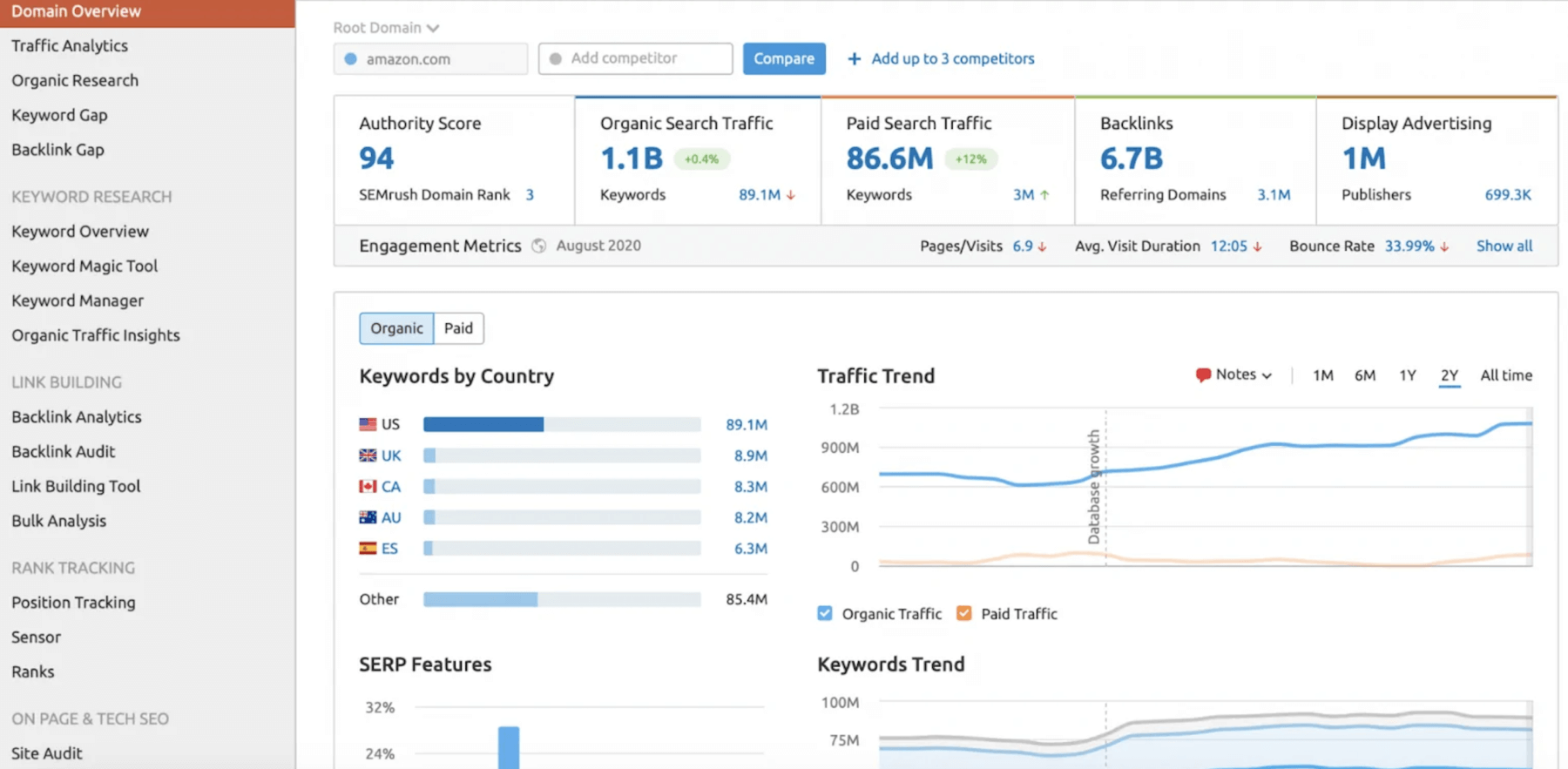
What it does well: Semrush is the industry standard platform for keyword research, search data, competitor analysis, content audits, content ideation, analysis of owned web pages, and more. Even with the list below we’re just scratching the surface of its functionality.
Capabilities:
- Developing content plans with keyword data
- Region-based keyword research
- Historical keyword research
- Keeping tabs on competitor site performance
- Longtail keyword discovery
- Can export thousands of keywords in a few clicks
- Content gap discovery
Who needs it: All marketers who publish written content online must have Semrush. Creating great content that will rank starts with the sophisticated keyword data of tools like Semrush. At Terakeet, we perform thousands of Semrush queries and it continues to be a go-to tool across our strategy for clients and for our internal marketing efforts.
Pricing: $ – $$$
Free trial: Yes
Ahrefs
What it does well: Ahrefs is another comprehensive tool for all aspects of content SEO and marketing. It currently has five core tools including site explorer, site audit, keywords explorer, and rank tracker. Like Semrush, Ahrefs is another must-have tool that can support your content and outreach efforts.
Capabilities:
- Scan your site for errors
- Conduct keyword research
- Analyze backlinks and link building
- Measure content marketing performance
- Huge content database to research topics and link opportunities
- Analyze your competitors site performance on multiple levels
Who needs it: From freelancers to CMOs, Ahrefs is an extremely useful tool that provides the data and analysis tools you’ll need for written content marketing, search engine optimization, and link building.
Pricing: $$ – $$$$
Free trial: No
Keywords Everywhere
What it does well: Keywords Everywhere is a browser plugin for Chrome and Firefox. When you search for a term, the plugin inserts detailed data on the right side of Google. It includes ranking difficulty stats, keyword trend data for your query, related keywords, People Also Ask suggestions, and related long-tail keyword opportunities. While some of the free data is useful, you’ll need to purchase credits to access more detailed data. Even when you do pay, it tends to be very affordable.
Who needs it: Good for freelance content marketer or small agencies with a limited tool budget. It’s not ideal for the power users Semrush caters to.
Pricing: FREE – $
Google Search Console
What it does well: A must-have for monitoring a single website or portfolio of owned sites, Google Search Console is totally free. This is the most important tool for keeping a website error-free and crawlable. Some of the features include:
- Ensuring Google can crawl your site
- Getting detailed traffic and acquisition data
- Error alerts for any site errors
- Seeing backlinks
- Troubleshooting your domain
Who needs it: Business owners, SEO and marketers, website admins, and developers need access to Search Console to manage websites.
Pricing: FREE
Best content marketing tools for ideation
All great marketing campaigns and content marketing efforts begin with human creativity, team brainstorms, and innovative thinking. Figuring out what your audience is talking and asking about online is critical if you want your great ideas to become reality. Thankfully, dozens of tools can do this and many are free. Check out these examples:
BuzzSumo
What it does well: BuzzSumo is an all-in-one platform for content discovery and trend research, brand monitoring, and influencer marketing. Users can enter a keyword, brand name, or other search and get a clear picture of the trends across news media, most social media platforms, YouTube, influencer networks, and other sources. Marketers and brands can:
- Access brand monitoring data
- Analyze and measure marketing campaigns
- Perform competitor intelligence analysis
- Empower their content strategy
- Handle digital PR
- Manage crises
- Get ahead of the trends
Who needs it: CMOs at large brands, marketers, PR professionals.
Pricing: $$
Free trial: Yes
Google Trends
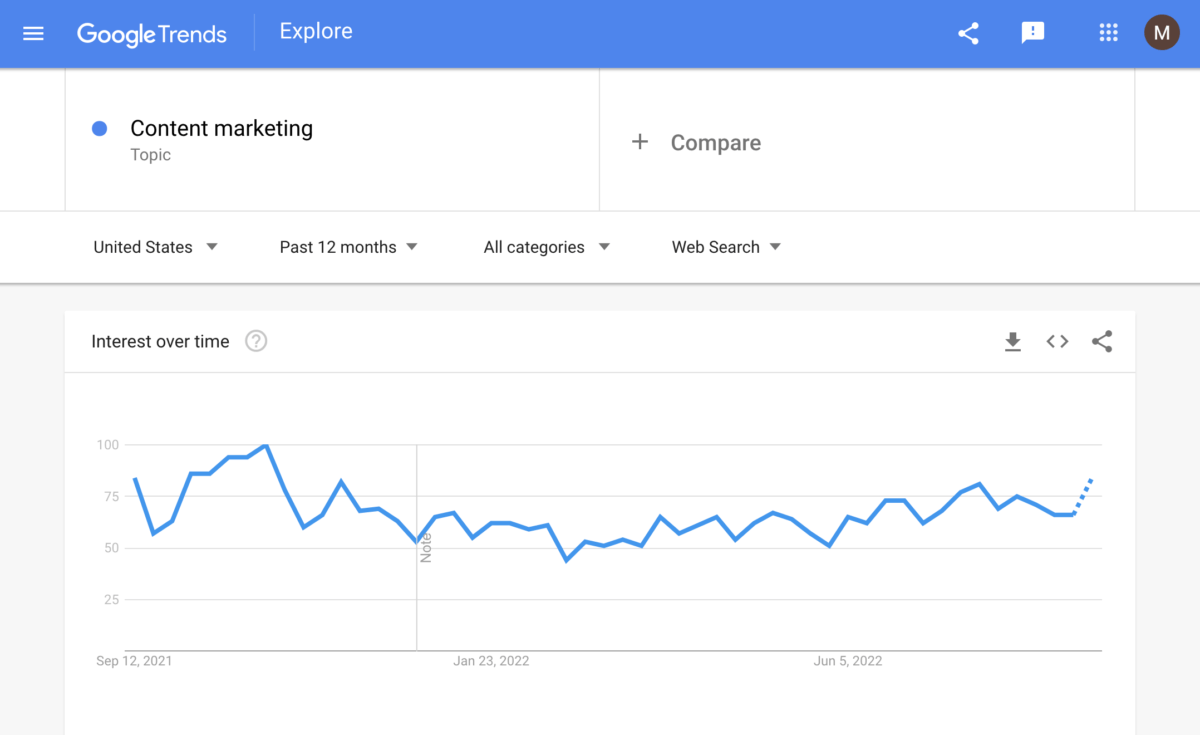
What it does well: Google Trends is a simple, free tool that can help one conduct high level search trend data analysis. Users can enter a term, view interest data, learn about related searches, which can help inform future content marketing ideas. It also offers some historical trend data that can help identify seasonal and cyclical trends. Google Trends lets you compare trending searches and gives the user a general idea of how people are using Google, and what’s being talked about online.
Who needs it: Content managers and producers can benefit from using Google Trends as a starting point for brainstorming, ideation, and planning. For specific keyword research, Semrush is more appropriate.
Pricing: FREE
Exploding Topics
What it does well: Exploding Topics is similar to Google Trends, but aims to provide high-level search trends to business leaders and marketers before they become overly saturated, competitive keyword spaces. Pro owners get features like multiple users seats, trend alerts, trend report emails, access to the trend database, and trend search. Again, this one can help at the early stages of content planning to inform your topics but for more sophisticated data, you’ll need a richer tool.
Who needs it: Like Google Trends, this is useful for content producers and content managers at the brainstorming stage.
Pricing: FREE – $$
AlsoAsked
What it does well: AlsoAsked is an aggregation tool for People Also Ask analysis. With more and more brands realizing the importance of controlling the answers to common questions on Google, having a tool that provides live People Also Ask data is very valuable. AlsoAsked is a great way to see how real people are engaging with Google.
Capabilities:
- Maps out live PAA results for a given query
- Visually presents the connection between PAA queries
- Helps marketers and SEOs target PAA answers to create controlled results
Who needs it: All SEO professionals can benefit from having access to live PAA data, but it can also help brand representatives figure out if there is confusion around their brand and offerings.
Pricing: FREE — $
Content creation tools
Let’s say you’ve got 15 amazing blog posts you’re dying to publish. Or maybe you’ve got some awesome design elements and one-pager ideas. Great! Now the hard part — you actually need to create them. The right content creation tools make all the difference in the world, they empower us as creatives, and let us experiment. Take a look:
Adobe Creative Suite
What it does well: Also known as Creative Cloud, Adobe Creative Suite is a pack of the industry standard design tools like Photoshop, Illustrator, Premiere Pro, and InDesign. The Creative Cloud All Apps package includes 20+ apps for social media, UX, web, photography, video, and design. Adobe apps cover every step of the creative process, across all campaigns.
Who needs it: Designers primarily.
Pricing: $ – $$
Free trial: Yes
Canva

What it does well: Canva is a free design tool that can create design elements, infographics, and other types of content. Focused on ease of use and starter templates, Canva is a great visual content design tool for non-designers. You can quickly draft a slick, modern featured image, popup, email graphic, blog post creative, social media posts, or other elements. Then you can quickly import the design wherever you need it. Canva is free but you can upgrade and get even more features.
Who needs it: Marketers and content creators who aren’t professional designers.
Pricing: FREE – $
Content marketing tools to improve writing
We all like to think we’re fantastic writers, and while that may be true, no one is perfect and every day as marketers there are opportunities to grow. That’s why having a stack of editing and proofreading tools is a great step. While your content must speak well to Google, don’t forget your audience is made up of real humans. Here are some must-have tools:
Grammarly
What it does well: Grammarly is a very useful cloud-based, automated typing assistant that ensures your writing meets grammatical standards and is typo-free. It can also handle tone, effectiveness, word choice, plagiarism checking, and other difficulties writers face while pursuing great content. The cool thing is that Grammarly follows you across apps, providing instant editing for Google Docs, Word, email, Slack, social media, Salesforce, and other common tools. The free version covers most common editing needs.
Who needs it: Anyone who writes substantial amounts of content professionally.
Pricing: FREE – $
ProWritingAid
What it does well: ProWritingAid is a unique writing-improvement tool that combines comprehensive live editing (20 different quality checks) with follow-up live masterclasses with writing experts. The app fixes your common errors, diagnoses issues, and gives you opportunities to target specific areas you need to improve. The ongoing interactive masterclasses provide specific help and expert guidance to level up your writing skills. Other editor apps simply correct errors, but this one also helps you grow as a writer using webinars.
Who needs it: Anyone who writes substantial amounts of content professionally.
Pricing: FREE – $$$$
Hemingway Editor
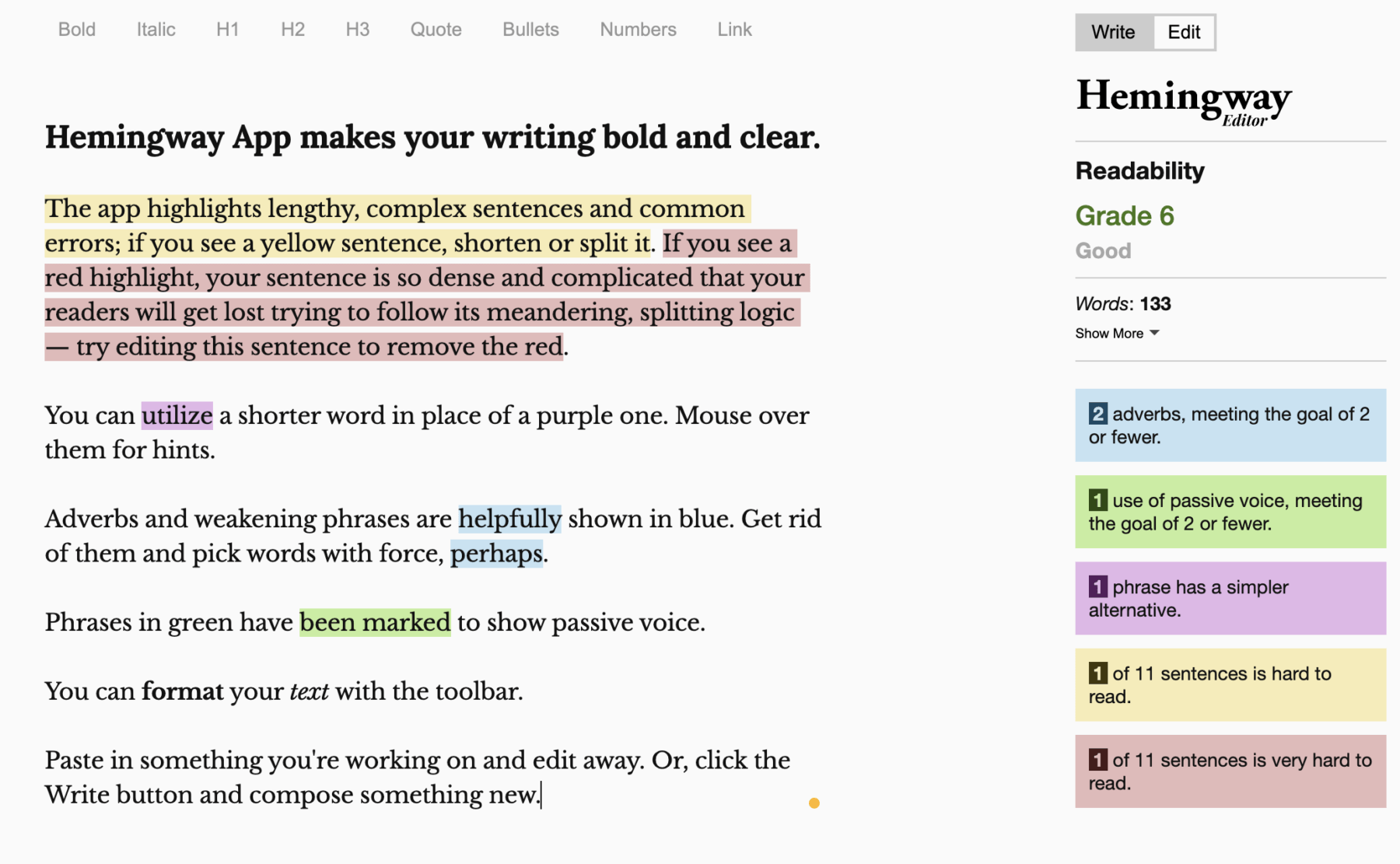
What it does well: Hemingway Editor is a simple, free tool that specifically targets editing around clarity and active voice. You can paste your content directly onto the website’s text editor. Then, the editor highlights overly complex sentences, offers shorter word replacements, detects passive voice and adverbs, provides an audience level, and a word count. Both ad copy and long form writing become clearer, punchier, and more modern with Hemingway. Plus, it’s free.
Who needs it: Anyone who writes substantial amounts of content professionally.
Pricing: FREE – $
Content optimization tools
When it comes to content designed to rank in a competitive marketplace, having fully optimized content is the difference between success and total failure. You must consistently create content that strategically targets your audience while outfoxing the competition with technical excellence. Talking to humans with your content should be paired with aligning with search engine requirements. These content marketing tools will improve your SEO copywriting skills:
Yoast SEO Tools
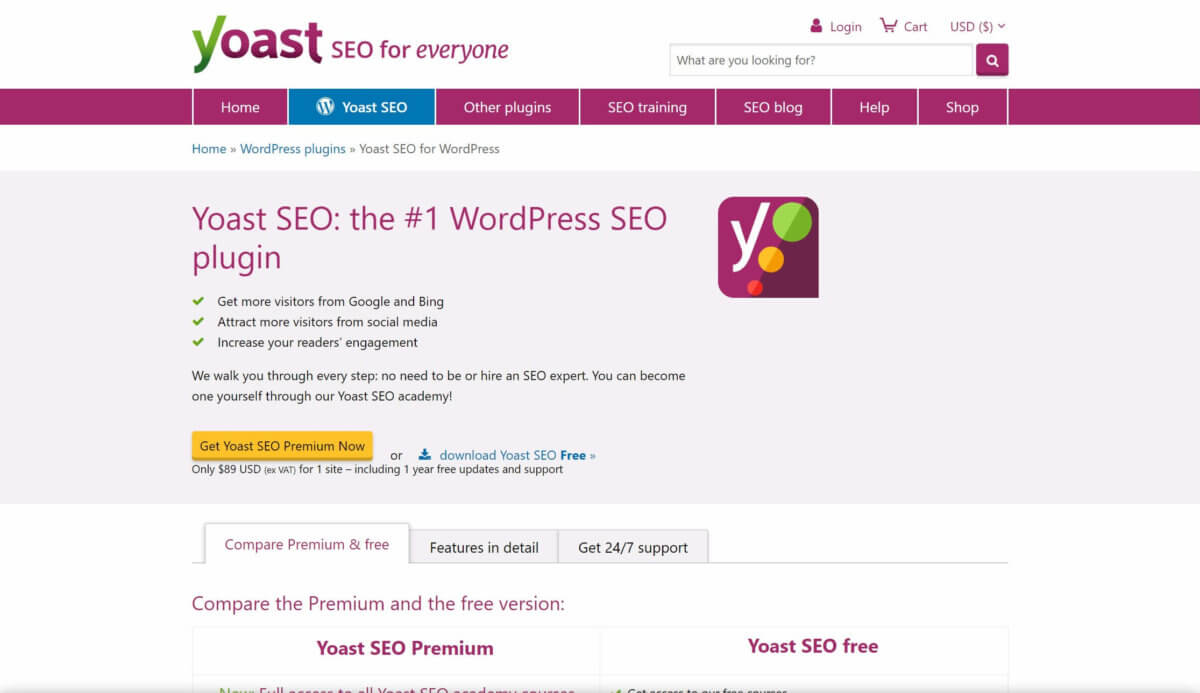
What it does well: Yoast offers numerous SEO resources and tools, but the Yoast WordPress plugins are especially powerful. The WordPress plugin is a one-stop SEO solution that covers all aspects of your website’s on-page optimization plus the optimization of individual pages and posts. It allows you to skip the technical jargon and quickly specify your overall SEO settings. Not only that, Yoast’s readability analysis double-checks your writing across several different metrics, giving you a score. For premium users, the tool does a deeper dive analysis of your writing. It’s amazing how much value Yoast provides through a plugin many use for free.
Who needs it: All individuals, brands, and organizations with WordPress-based websites.
Pricing: FREE – $$
Clearscope
What it does well: Building any content, whether blog posts or product landing pages, often comes down to placing the right language and keywords in your content. Clearscope allows users to input a keyword and get reports covering the competitors, word count, difficulty, and the most important co-occurring terms.
The most powerful aspect of Clearscope is the text editor. You can paste or write directly in its editor, all the while getting real-time feedback on your usage of co-occurring terms. It provides a letter grade when you’re finished writing and displays missed keywords so you can fix gaps in your content. We find that writing for A++ score tends to keep you on track for a top 10 rank.
Who needs it: Content writers and strategists.
Pricing: $ – $$$$
Free trial: Demo only
Content distribution platforms
Whether you use traditional PR efforts, influencer marketing, or both, your marketing mix should include a promotion strategy. Use digital press release websites as well as innovative tools to spread your message far and wide. Explore these content distribution tools to expand your audience.
PR Newswire
What it does well: PR Newswire is one of the oldest press release distributors, founded in 1954. While it has undergone a transformation into modern press release distribution, the brand also offers media monitoring, creative services, communications, and real-time analytics. The site has become a hub for journalists and brands, connecting both parties. If a brand wants press release news spread, PR Newswire offers a claimed 48% media pickup, which can provide a substantial lift.
Who needs it: CMOs of larger brands, PR professionals.
Pricing: $ – $$$$
Free trial: Demo only
Business Wire
What it does well: Another press release distributor, Business Wire disseminates company press releases to news media, investors and financial markets, disclosure systems, social media, bloggers, and other entities. This is a modernized version of the classic press release model with substantial reach and media pickup.
Who needs it: CMOs of larger brands, PR professionals.
Pricing: $$ – $$$$
Free trial: No
The Brand Intelligence Report
Exclusive AI insights, search trends, and brand strategies, delivered to your inbox.
Content marketing tools for email
Content marketing minus thoughtful, well optimized email communications, newsletters, and transactional emails will always miss the mark. Today’s marketers understand email is a core strategy to any campaign. That’s why picking the right email platform that’s customizable and automated is a key step.
Mailchimp
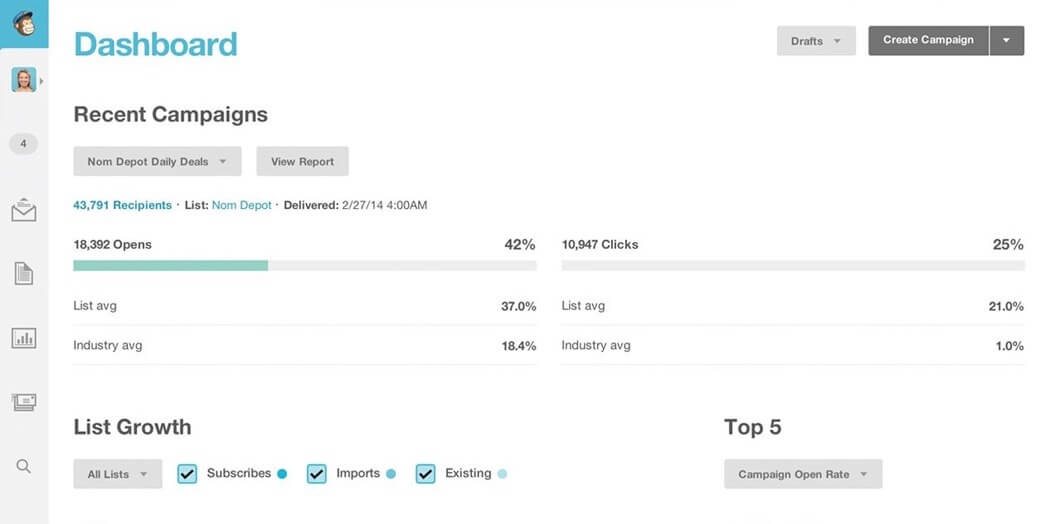
What it does well: Mailchimp is a long-established email marketing platform that offers full email marketing services, ecommerce support, and transactional email services. Mailchimp’s email offerings make collecting audience emails, building emails and content development, list growth, analysis of conversion rates, testing, automation, and user journey management easier and more efficient. Mailchimp is one of many email marketing platforms, but it’s also one of the best. It’s also capable as one element of customer relationship management (CRM).
Who needs it: Email marketers from small to large companies.
Pricing: FREE – $$$
Content tools for social media marketing
No marketing initiative is complete until you distribute your message via multiple social media channels. However, that can be challenging if you don’t have a large social media team.. Fortunately, there are several content strategy tools you can use to schedule, cross-post, and efficiently manage content across all your social channels. Our top picks include:
Hootsuite
What it does well: Draft, schedule, and measure social posts across platforms like LinkedIn, Twitter, Facebook, and Instagram. Hootsuite is built to handle all aspects of social media management. Instead of posting updates to each social channel, Hootsuite lets you create your posts and schedule them on its dedicated platform. Without a social media management system, businesses with many social accounts can’t keep up. The business and enterprise levels offer workflows, media libraries, social advertising management, and administrative options.
Who needs it: Social media managers.
Pricing: $$ – $$$$
Free trial: Yes
Sprout Social
What it does well: Sprout Social is similar to Hootsuite, but it focuses on the communications and audience engagement aspects of social media management. Described as a social media intelligence tool, Sprout Social helps marketers manage conversations, publish and schedule posts, and analyze social efforts. What makes Sprout unique is its ability to uncover important insights from engagements with your audiences across social media. Businesses can use these insights to craft better stories across their social presence. It also has a tool to build shareable content that your employees can share to become ambassadors for your brand.
Who needs it: CMOs, social media managers.
Pricing: $ – $$$$
Free trial: Yes
Content marketing analysis tools
On the tail end of content marketing is measuring the impact, utilizing KPIs and metrics, and determining the ROI of various campaigns. With analytics tools, you can get a clear picture of how your campaigns were received, by whom, and how to prioritize future campaigns. Here are some impact-measurement tools to try:
Google Analytics
What it does well: For managing the performance of one or more owned web domains, look no further than the tried-and-true (and free) Google Analytics. Simply create an account, generate your tracking ID, and add it to your site’s code to start getting highly accurate audience data. Google Analytics can be complicated because it gives you all the tools but requires you to set them up to fit your needs. But for SEO professionals, it’s a breeze. Given the sheer number of tools that are built into Google Analytics and its free model, it’s the central nervous system of your website’s audience metrics and measurement.
Who needs it: Webmasters, website owners, SEO professionals, SEO-minded marketers.
Pricing: FREE
Final thoughts
At any stage in the content marketing process, there’s likely a tool for marketing automation, simplification, or saving time on the less glamorous aspects of building amazing content for your campaigns. From organization to success measurement, and everything in between, we highly recommend choosing a stack that works for you pricewise and covers your needs. This list should get you started, but we also suggest doing your own research as well.
Keep in mind that these tools are designed to empower your strategy — not be your strategy. This is an important distinction to make.




